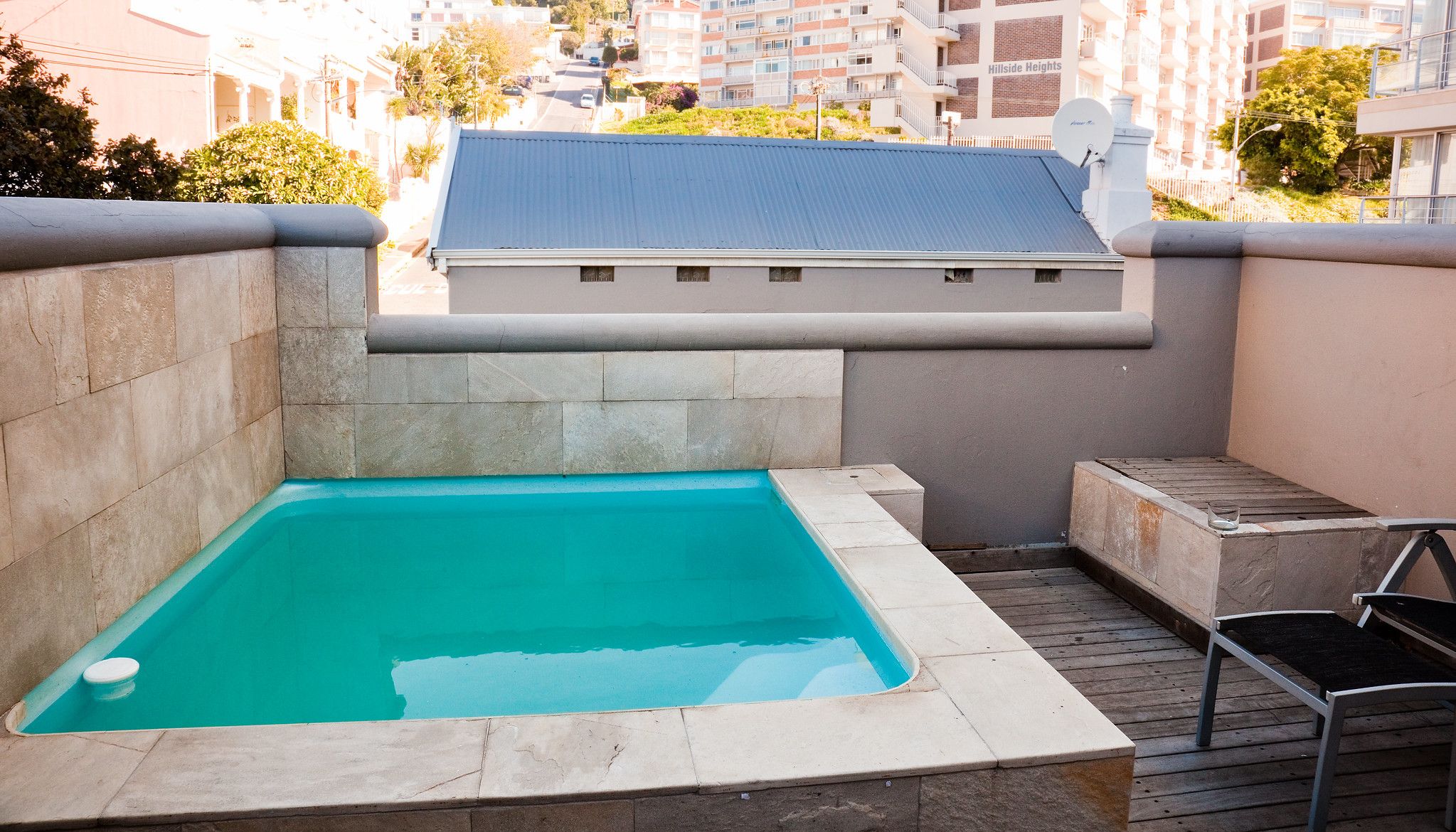
Plunge Pools, Cocktail Pools, and Spools: Which Pool Is Best for You?
Installation & Construction | Pool Design Guides | Swimming Pool FAQs
What can you do if you really want a swimming pool, but you don’t have a lot of yard space? In years past, you basically had two options.
You might have been lucky enough to know someone who had a pool and liked you enough to have you over for a dip and a swim. But in most cases -- I’m speaking from experience here -- you probably had to head out to your neighborhood’s public pool to bob around with random strangers and their kids while trying to avoid thinking about whether the pool's chemistry is sufficiently maintained (we're referring to the 8-year-old who's been downing capri-suns all day and hasn't, once, taken a short walk to the restroom).
There are more options these days. Let’s talk about a few of these more compact aquatic options for smaller backyards: spas, hot tubs, plunge pools, cocktail pools, and spools.
Spas and hot tubs have become popular features in backyards of all sizes, particularly in colder climates where you’d rather warm up than cool off.
We have three spa add-on options: the RS08, the SP08 and the SS08, each of which holds slightly less than 900 gallons of water in roughly 72 to 80 square feet (8 by 8 or 9 by 9). Spas aren’t always heated -- in fact, a spa can sometimes serve as a cocktail pool or spool.
A brief overview of cocktail pools and spools
What is a cocktail pool? The shorter answer is that it’s really just a small pool. “Spool” is a newer term used for cocktail pools with more traditional spa features, but in many cases, the two terms are essentially interchangeable.

We personally prefer the term “cocktail pool” because, unlike “spool,” it doesn’t sound like something your grandma might have at her sewing table.
Cocktail pools can have heated jets (making them more like spas or hot tubs).
They can have bench seating.
They can be installed aboveground, semi-inground, or inground.
They can be one part of a larger pool and patio area, or it can serve as the centerpiece of a smaller yard.
They can provide just about any feature you’d want from a full-size swimming pool, in a much more compact footprint.
However, cocktail pools have one major disadvantage: they tend to be shallow.
That’s where plunge pools come in.
What is a plunge pool?
A plunge pool, at the most basic level, is a smaller pool that’s still deep enough to “plunge” into. Cocktail pools might be three or four feet deep. A plunge pool could be six feet deep, or even deeper if you wanted it to be -- but most plunge pools tend to have between four and five feet of depth.
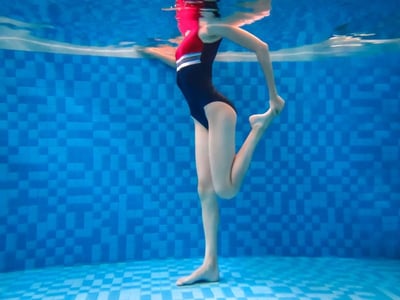
Most folks sit in cocktail pools or spools. Many of those folks will have an occasional drink in their cocktail pools… hence the name.
Plunge pools are meant to be a bit more active.
You can stand in a plunge pool to do aquatic exercises, and you might even be tempted to do a cannonball into some of the deeper plunge pools. For the record, we strongly advise against the cannonball idea.
It’s an effective and efficient compromise between a spa or cocktail pool and a full-size pool, but there aren’t any hard-and-fast rules as to the specific dimensions of any of these types of pools.
We’ve seen these terms used interchangeably quite a bit, and plunge pools can sometimes even get mixed up with infinity pools. It’s possible to install a plunge pool with an infinity edge (just as you could probably convert any other type of pool into an infinity pool with enough commitment and capital), but this can spike the price of your pool project by quite a bit.
Some pool builders might call our R20 model a cocktail pool. It could be considered a plunge pool, too, as it’s definitely deep enough for some water aerobics and light horseplay. We just think of the R20 as a small but full-featured pool. It’s a great option for a smaller backyard, no matter what you want to call it.
Knowing what you can (and want to) put in your backyard is the most important key to a successful pool installation, whether you want an eight-by-eight square plunge pool in your sunroom or an Olympic-sized pool in your massive backyard.
What are the benefits of plunge pools?
Plunge pools can be great choices for homeowners with less space in their backyards. Some homeowners even install small plunge pools in sunrooms or enclosed areas to have a consistent environment for casual recreation or regular exercise.
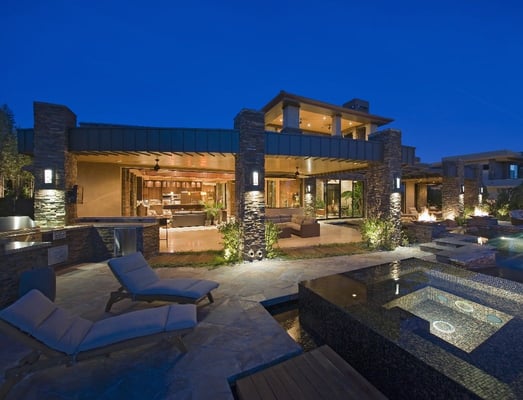
If you have a small backyard in a hot and dry climate, and you want to cool off without running the air conditioner all day long, a plunge pool might be the perfect solution.
Plunge pools give homeowners (plus their friends and families) many benefits, and a quick dip during hot summers can be tremendously refreshing and restorative.
Well-designed plunge pools made with high quality materials -- like fiberglass, for example -- can also add value to your home, in much the same way a larger pool might add value to homes with big backyards.
A smaller plunge pool can be a great space for aquatic exercise for one or two people, as we mentioned before.
In fact, some plunge pools are equipped with strong jets or pressure currents that create a flow of moving water in one direction, allowing you to swim “laps” without actually moving around.
Some Olympic-caliber swimmers use plunge pools with this functionality, but it’s accessible to anyone who knows how to swim aerobically, whether you’re 4, 44, 94, or any age in between.
Larger plunge pools can host a few folks in a backyard house party, and if constructed to the ideal depth, they’re a great place to stand and cool off.
Because plunge pools are smaller and (generally) simpler than full-size swimming pools, they’re also less expensive to maintain. You won’t need to use as much electricity to run your pool filter, and you won’t need to use as many chemicals to keep your plunge pool’s water clean.
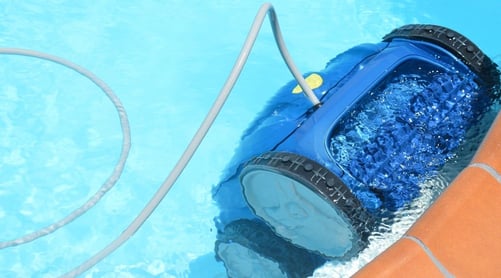
The equipment you’ll need to clean your plunge pool will also probably cost less than full-size swimming pool cleaning equipment, since you’ll be able to use things designed to treat smaller volumes of water.
You can use pumps, filters, robotic pool cleaners, and other equipment that cost a fraction of what you’d spend on similar equipment designed for 20,000 or 40,000-gallon pools.
What are the drawbacks of plunge pools?
Plunge pools aren’t for everyone.
They’re compact and convenient, but plunge pools might not be the best choice for those of you with larger backyards and/or bigger pool party ambitions.
Plunge pools are deep enough to take a “plunge,” but this often comes at the expense of in-pool seating space. You’re unlikely to find a true plunge pool with a tanning ledge, either. If you prefer to sit or lie down in part of your pool, you might be better off with a cocktail pool or a full-size swimming pool.
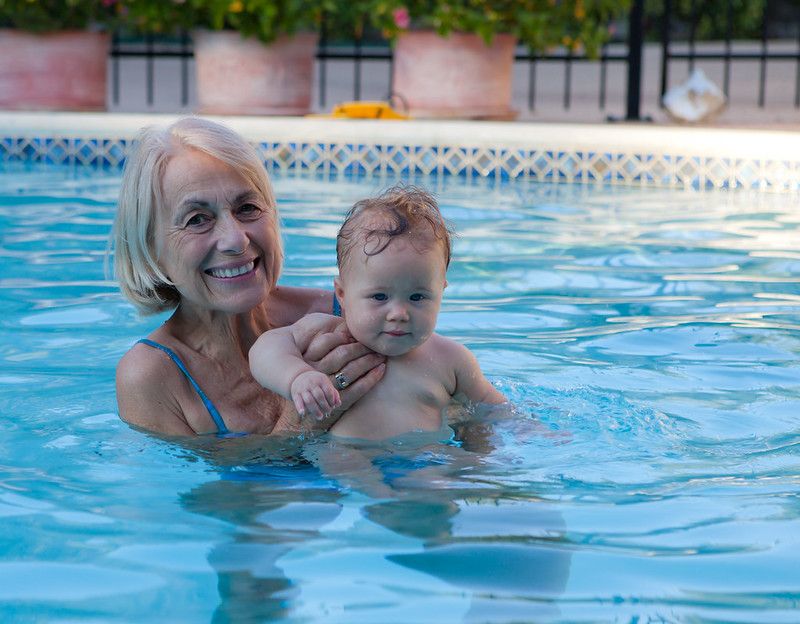 Swimming with grandma, by Lars Plougmann
Swimming with grandma, by Lars Plougmann
This lack of side-wall features can make plunge pools harder to use for folks with mobility issues. Small children and grandparents might have a tough time getting in and out of a plunge pool with no steps.
Some plunge pools may have built-in steps, or you may be able to customize your design to include them. However, you shouldn’t expect the easiest access to a smaller, deeper body of water that you might get from a cocktail pool or a full-size swimming pool with all the bells and whistles.
Ready to take the plunge on a new pool? Let’s talk!
Every pool has its pros and cons, and plunge pools are no different. But if you have enough space and enough capital, you might not have to choose between a plunge pool and a full-size swimming pool.
Big backyards can accommodate quite a bit of pool, and you might even be able to install a full-size pool outside and still have a personal plunge pool in a nearby sunroom. Your pool options are ultimately only limited by your space, your willingness to spend, and your own imagination!
If you're shopping around for a fiberglass pool, feel free to take a look at our catalog of models, visit our extensive video library, try out our pool cost calculator, or request custom pricing using the button below.
Editor's note: This article was originally written by Alex Planes and was updated on December 18, 2024, with current information. River Pools is a brand of inground fiberglass pools produced in a manufacturing facility in Fortville, IN. While our expertise is in manufacturing fiberglass pools, we have access to a network of installers with expertise relating to project design, installation, and pool service. We often tap into this knowledge base and share information freely with homeowners, just like you, considering installing a swimming pool in your backyard.




